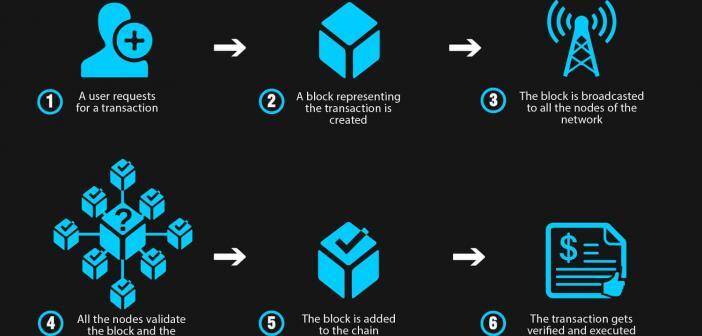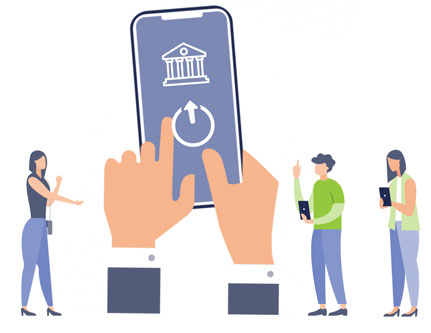
As per the research global technology market is forecasted to grow 2.3 billion in U.S dollars by 2021. Isn’t that huge enough? Ever since Santoshi Nakamoto published his invention in 2009, Blockchain technology has added the flavour not only in financial industry but also across other verticals.
What is Blockchain technology and what problem it can solve?
Today, with the advent of new technologies, internet has revolutionized the way people communicate. We make the use of payment gateways to share and transfer information back and forth; but is that really secured? Databases cannot communicate with each other, it needs error-free human administration or a centralized station to run every node.

So, here the Blockchain technology comes into existence. It is decentralized ledger shared by multiple users and works without the interference of third-party. This technology tracks every details that happens on the internet – every digital transaction, private data, service etc. Data is encrypted into blocks and gets scatter into pieces across worldwide network of distributed nodes.
Hence, because of this reason:-
- Electronic ledgers can become cheap than traditional account system
- Distributed ledger system nullifies repetitive task and results into less error
- Lessen up the risk of pending transaction as processing delays
Blockchain has three main features of distributed ledgers:
- Veracity – multiple copies (as opposed to a single copy) of the complete historical record of ledger entries are each verified by consensus.
- Transparency – it is a public record of activity that can be seen by all market participants.
- Disintermediation – Instead of specific central organization, this operates using peer-to peer network.
Blockchain technology is the pillar behind the success of the bitcoin and is the first digital currency to solve the issue of double- spending. This technology is transformative and several predicts expects that it will have massive impact in the market.
“One Bitcoin can be divided by 100 million units, and each unit can also represent value in multiple ways – i.e.; cash, property, votes, energy.”
Implications of transaction in Blockchain technology

Blockchain technology will revolutionize the way we write, execute transactions and maintain records. Keeping accounts of all transactions is the core criteria for any business as it becomes easy to track the last performances and help in planning the need for the future. Some records consume time, energy and efforts and often creation and storage process results in errors.
In the current scenario transactions can be executed immediately but settlement of the funds takes a long process. For instance: Someone selling in the stock exchange can sell stocks immediately but settlement can take few days. Similarly, if someone is making the new deal of buying property, price can be negotiated and signed quickly, but process of registering takes more time and may involve lawyer, government and employees.
But, in the Blockchain technology, transaction process is quick and permanent and distributed across nodes, and details of transaction such as price, asset etc. are recorded, verified and settled within seconds across all nodes and any change in one ledger simultaneously affect the other copies of ledger. Since each transaction is transparent and permanently recorded, there is no need of third party verification and is open for anyone to see.
What makes distributed technology different?

The key difference of Blockchain is the ability to transact without the need of trusted third-party through distributed ledger.
Ultimately, distributed ledger technology represent significant innovations. They have broad implications, including:
- Operational simplification and fraud minimisation
- Digital identity
- More transparency in transactions.
Fraud minimization

One of the advantages of distributed ledger technology is that manual efforts to perform reconciliation and resolving disputes can be drastically reduced. Traditional accounting system means parties involved in one project need to check the system and find the reason why they disagree. Instead with the help of Blockchain the same thing can be migrated in number of ways as all parties involved share the same record.
For businesses, Blockchain increases the efficiency, reduction in duplicated and manual tasks and cut-cost and provides opportunities for businesses to focus on value-adding task and facilitate trust along with supply chain. Businesses which regularly deal with unknown customers faces risks, where a business is not sure that its customer will comply with contractual terms. Goods are delivered, but the customer may not make payment for days or weeks. This ties up capital and can cause cash flow problems. Blockchain technology has the capability to minimise risk and settlement times, which ultimately aids in improving balance sheet efficiency.
More transparency in transaction

Distributed ledger provides transparent information in real-time transactions and hence, those currently gaining competitive advantages via imbalance of information is likely to put an equal foots with the rest of the market. Individuals will be able to understand which organizations have used which data under what circumstances and this enables more consumer decision making. The tracking of goods over Blockchain will also provide greater transparency and simpler process for businesses and would enable increased cooperation between regulators and regulated entities.
Example:
SimplyVital Health is using Blockchain technology to give healthcare industry a facelift. The company is using the Blockchain-based data storage and analytics platform aimed for streamlining medical data storage and sharing.
The Bottom line
Blockchain technology is here to stay and is transforming the way society functions. Being still in an early stage, crypto currencies are only its major use case. Above perspectives may sound promising, but business need to come up with the kickass solution or connect with the Mobile Application Development Company that can nurture your product as per your requirements in a better way.


